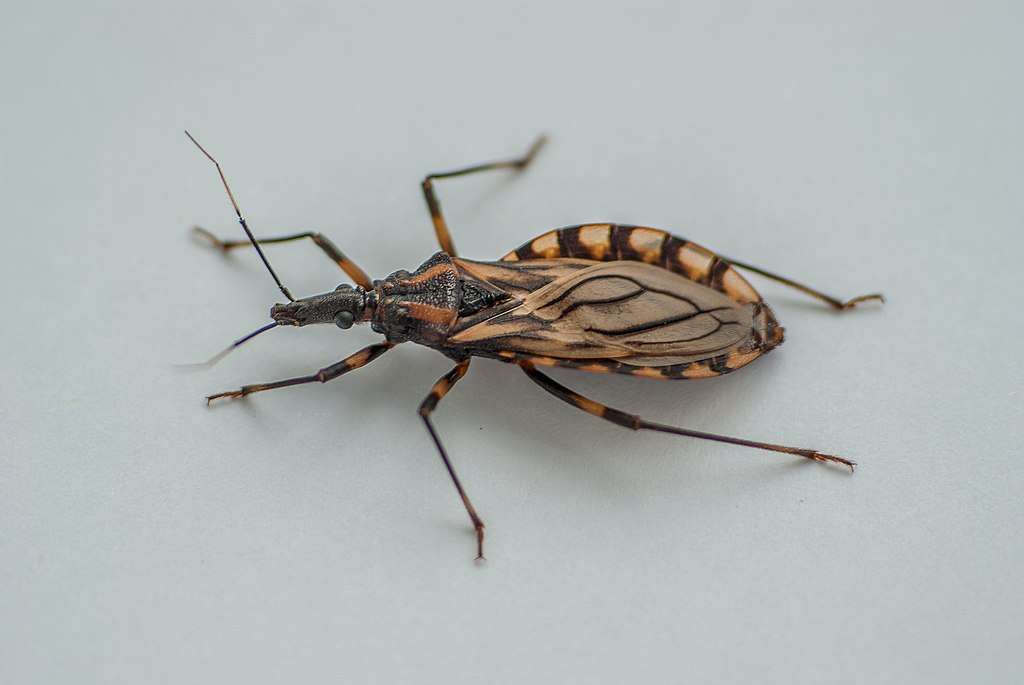
Kissing Bugs: What Are They, Where Are They, & How Do You Prevent Them
Don’t let this bug’s name fool you. If the kissing bug shows up at your place, you don’t want to pucker up.
The latest pest to watch out for is Triatominae, commonly called “kissing bugs” because they bite humans on the face and lips, feeding on their blood, often while they're sleeping.
Since we’re not sure how much longer you’re going to read this creepy story, let’s cut to the chase, landscaping-wise:
This bug likes to hang out in old piles of leaves and lawn debris.
If spring isn’t enough to convince you to clean up your property, this guy should be.
What Are Kissing Bugs?
Kissing bugs are about an inch long, and many in the United States have orange or reddish markings on their bodies, and skinny, elongated heads.

They’re mostly nocturnal, so kissing bugs hide out during the day and feed on blood at night. Their saliva contains an anesthetizing agent, so you’re not aware that it’s biting you and feeding.
Their bite itself isn’t dangerous, but the bug has a rude habit of pooping after it bites. And its feces contain the parasite Trypanosoma cruzi that causes Chagas disease, a potentially fatal illness that has afflicted millions around the world, especially in Mexico, Central America and South America.
If you inadvertently rub your skin where the insect bit you, you might accidentally rub the feces into the wound and contract Chagas disease.
Where Are Kissing Bugs?
The kissing bug hasn’t been much of a threat in the U.S., mostly hanging out in Latin America.
But nearly 30 states have now reported cases of the bug, most recently in Pennsylvania and Delaware, according to researchers at Texas A&M University. And it appears to be headed north.
Why You Should Care
The Centers for Disease Control and Prevention reports nearly 300,000 people in the United States are infected with the parasite the kissing bug carries. Symptoms of Chagas disease include fever, fatigue, body aches, headache, a rash where the parasite entered the body and swelling around the eyelids.

The disease can cause serious cardiac and gastrointestinal complications, according to the CDC.
Don’t Squish Kissing Bugs
What to do if you think you have kissing bugs on your property? If you see a kissing bug, the CDC advises against touching or squashing it.
Put it in a container, and then fill it with rubbing alcohol or freeze it. Then take the bug to a local extension service, health department or university laboratory for identification.
How To Tell If You Have Kissing Bugs On Your Property?
Watch for the wingless, orange-spotted bugs in yard debris. Signs that they’re inside your house:
- Bugs in your mattress or pillow.
- Tiny blood stains on sheets and pillow.
- Patches of bites on family members, often around the mouth. The bites are usually painless, but they may swell and look like hives.
How To Prevent Kissing Bugs? Tidy Up
Keep the bug out of your house by sealing cracks and gaps around windows, walls, roofs and doors with a silicone-based caulk.
Use screens on doors and windows and repair any holes or tears. Replace weather stripping and install door sweeps.
Kissing bugs like to hang out in piles of wood, leaves and yard debris, so experts say to keep your property cleaned up.

Here in the Washington DC area, all the extra rain we’ve received in the last year means grass is growing extra fast. That can cause clumps of grass clippings to form after mowing.
Level Green Landscaping crews use mulching blades and kits on mowers, and take care to blow grass clumps off the properties after mowing.
Not all landscaping companies are as picky as we are, so be sure your property is kissing bug-proof.
Keep Your Property Clean & Clear With Level Green
 We’re experts in property cleanup. We’ll whisk away your piles of yard debris, leaves and brush. After we mow, we leave no messy clumps of clippings behind.
We’re experts in property cleanup. We’ll whisk away your piles of yard debris, leaves and brush. After we mow, we leave no messy clumps of clippings behind.
If you’re not already a Level Green Landscaping client, we’d love to add you to our growing list of happy customers.
Our focus is on commercial properties like offices, mixed-use sites, HOAs, municipalities and institutions in Maryland, Washington DC and parts of Virginia.
Contact us at 202-544-0968.
You can also request a free consultation online to meet with us one-on-one.
We’d love to hear from you.
Image sources: kissing bug gray background, kissing on skin, kissing bug on wood

Douglass Delano
Doug Delano (and Bill Hardy) opened Level Green Landscaping LLC in 2002 to offer Washington DC, Maryland and Virginia reliable commercial landscape maintenance services.

